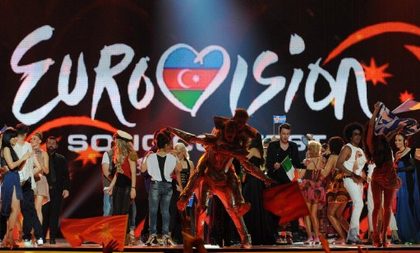SUMMARY
This is AI generated summarization, which may have errors. For context, always refer to the full article.

BAKU, Azerbaijan (AFP) – Azerbaijan this week hosts the Eurovision song contest, the biggest event the ex-Soviet state has ever held, where singing pensioners will challenge the younger generation for the kitsch pop crown.
The run-up to the event has been marred by accusations over Azerbaijan’s rights record and forced evictions of locals, but the government is hoping the event will be a unique shop window for the increasingly glitzy capital Baku.
Among the favorites at the 57th edition are a troupe of dancing grannies from an obscure Russian village, the Buranovskiye Babushki, and veteran British crooner Engelbert Humperdinck who first topped the UK charts 45 years ago in the era of the Beatles.
At 76, Humperdinck will be the oldest male ever to sing at Eurovision, while one of the traditionally-costumed Russian ensemble will be the oldest woman.
Forty-two countries will compete for musical supremacy and national pride in Baku, where Eurovision is being held for the first time after duo Ell and Nikki won in the German city of Duesseldorf last year.
Sweden’s high-energy techno-pop entry “Euphoria” by Loreen is this year’s best bet according to many bookmakers, who also tip Russia, Italy, Serbia, Romania and Britain as potential challengers at the televised contest watched by an estimated 125 million people around the world.
As usual most of the contestants will be singing in English, although Russia’s Buranovskiye Babushki will deliver some lines in their Udmurt language and the peculiarly-named Austrian entrants Trackshittaz promise “tractor gangster party rap” lyrics in a little-known regional dialect.
There will be two semi-finals on May 22 and 24, with 10 from each going on to the final on May 26 alongside Azerbaijan, France, Germany, Italy, Spain and Britain.
International viewers can vote for their favorites in the final by phone or text message and these results will then be merged with scores awarded by professional juries in each country to reach a verdict.
Some past winners, like Swedish pop maestros Abba who triumphed in 1974 with the irrepressibly catchy “Waterloo”, have gone on to lasting fame and critical acclaim.
Other entrants however have been mercilessly mocked for their inane kindergarten-style lyrics, even though the competition’s initial aim was to “stimulate the output of original, high-quality songs”, according to the book “Eurovision Song Contest: The Official History”.
The authorities in Azerbaijan, an oil-rich, mainly Muslim state of 9.2 million people, hope the contest will attract international acclaim to a country until now mainly known as an energy exporter on Europe’s eastern fringe.
Unlike some European countries which see Eurovision as little more than frivolous fun, Azerbaijan has treated it like an event of major political significance, spending millions of dollars on beautifying the capital.
The organizers have promised a spectacular show spiced up with elements of traditional Azerbaijani culture at the ultramodern, purpose-built Crystal Hall on Baku’s Caspian Sea shore.
“Eurovision will make Azerbaijan famous worldwide. It is our pride that it’s being held here in Baku,” said local student Lala Mirzoyeva, 22.
“I’m so happy that I managed to buy tickets and I will be part of this historic event,” said another, 31-year-old banker Ramil Salayev.
But rights groups accuse the government led by strongman President Ilham Aliyev of systematically violating human rights, jailing opponents, persecuting journalists and suppressing free speech.
There has also been concern over the evictions of tenants whose homes were demolished as part of an urban regeneration project which includes the Crystal Hall.
“Azerbaijan is doing its best to put on a show but people should know about the real problems behind all the glitz and glamour,” said Giorgi Gogia of campaign group Human Rights Watch.
Neighbour Armenia has meanwhile boycotted this year’s contest, citing alleged security concerns after the Azerbaijani president described Armenians as enemies. – Elman Mamedov, Agence France-Presse
Add a comment
How does this make you feel?
There are no comments yet. Add your comment to start the conversation.